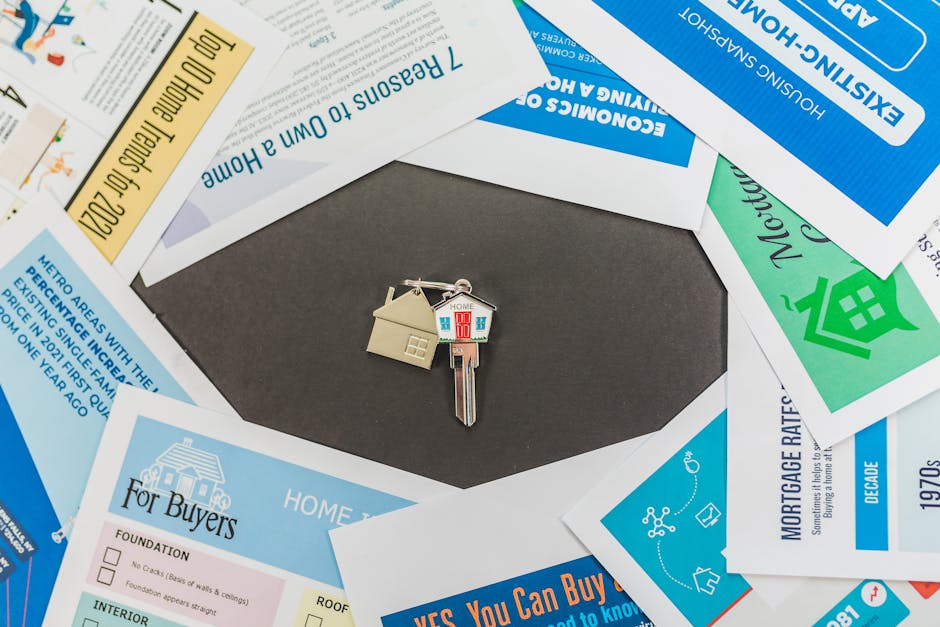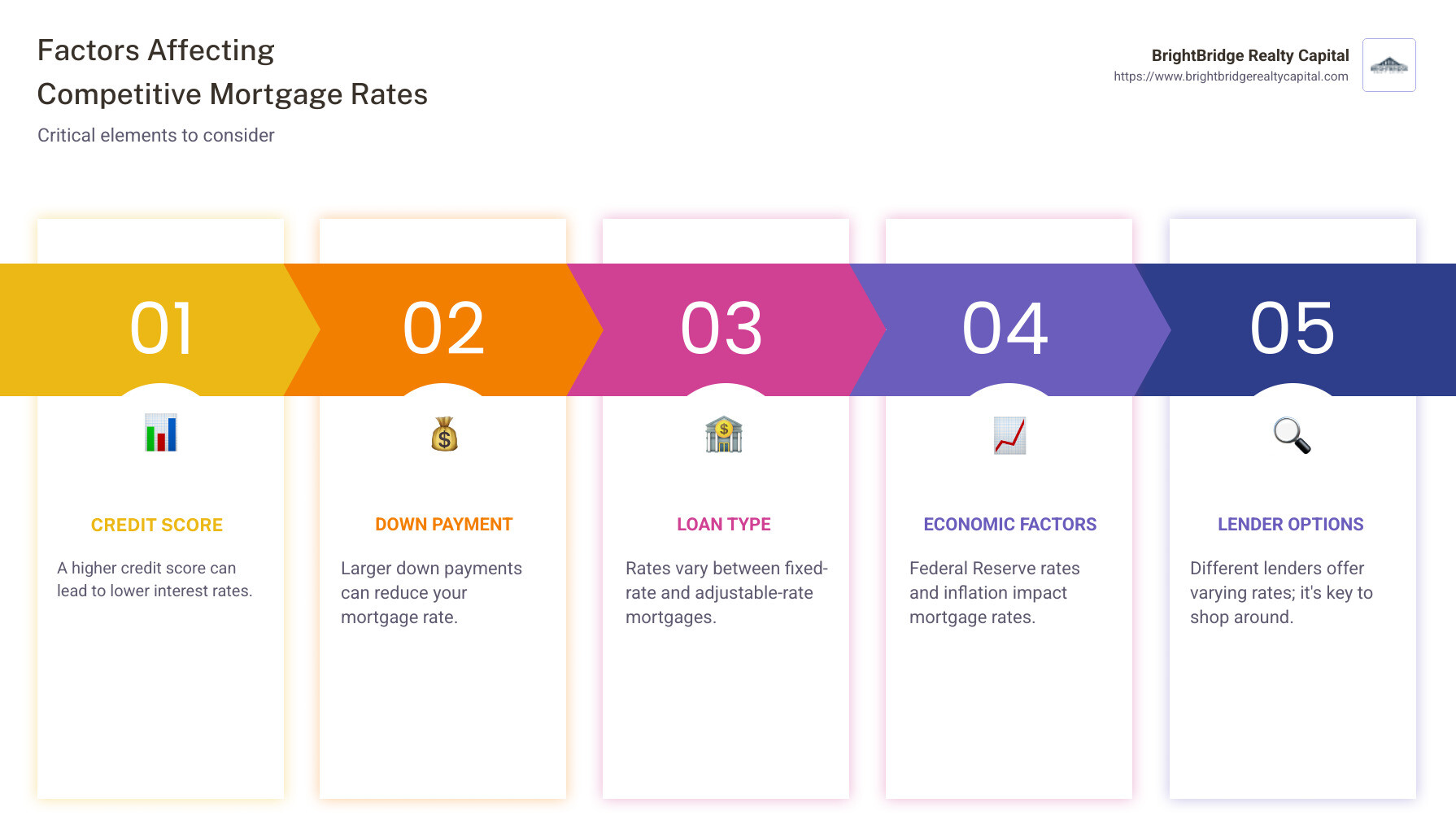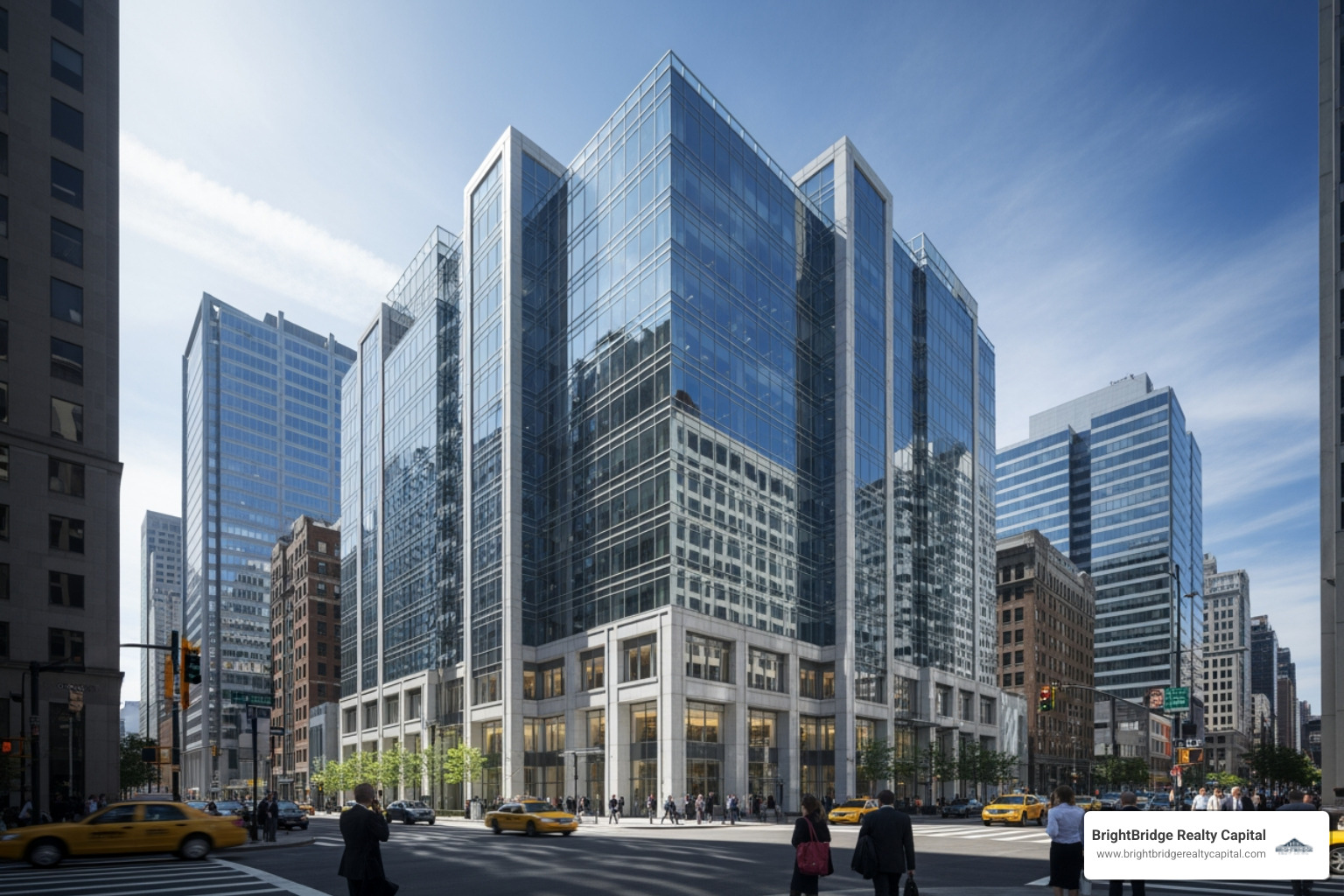Competitive Mortgage Rates: How to Get the Best Deal

Introduction
Finding competitive mortgage rates is crucial for real estate investors looking to maximize profit and secure cost-effective financing options. Mortgage rates—the interest charged on a home loan—are influenced by a variety of factors, and securing the best rate can significantly impact the cost of borrowing.
Here's a quick guide to the essentials of competitive mortgage rates:
- Credit Score: A higher credit score often translates to lower interest rates.
- Down Payment: A larger down payment can help reduce your mortgage rate.
- Loan Type: Rates can vary widely between fixed-rate and adjustable-rate mortgages.
- Economic Factors: The Federal Reserve, inflation, and broader economic conditions play a significant role in determining rates.
- Lender: Different lenders offer varying rates; shopping around is key.
Understanding these elements can help you steer the landscape of home loans effectively, ensuring you secure the best deal for your investments.

Understanding Competitive Mortgage Rates
When it comes to competitive mortgage rates, understanding the types of interest rates available is key. Let's break down the basics.
Interest Rates Today
Mortgage interest rates are influenced by several factors, including the Federal Reserve's policies, inflation, and the bond market. As of now, the average interest rate for a 30-year fixed mortgage is around 7%. These rates can fluctuate based on economic conditions, so staying informed is crucial.

Fixed- and Adjustable-Rate Mortgages
Fixed-rate mortgages have an interest rate that remains constant throughout the life of the loan. This means your monthly payments remain the same, making it easier to budget. Common terms for fixed-rate mortgages include 15, 20, and 30 years. For example, a 15-year fixed mortgage might have a rate of 6%.
On the other hand, adjustable-rate mortgages (ARMs) start with a lower interest rate that can change over time. The rate is typically fixed for an initial period—say, five years—and then adjusts based on market conditions. ARMs can offer lower initial payments, but there's a risk of rate increases later on.
Personalized Mortgage Rates
Your mortgage rate is not just a number pulled from thin air. It's personalized based on your financial profile. Factors such as your credit score, the size of your down payment, and your debt-to-income ratio all play a role. A higher credit score can lead to better rates, potentially saving you thousands over the life of your loan.
To get the best deal, compare offers from multiple lenders. Pay close attention to the annual percentage rate (APR), which includes the interest rate and other fees. This gives you a clearer picture of the total cost of the loan.
By understanding these key elements, you can better steer mortgages and secure a rate that aligns with your financial goals.
In the next section, we'll explore how to compare different mortgage offers effectively.
How to Get the Best Competitive Mortgage Rates
Getting the best competitive mortgage rates means more than just finding the lowest interest rate. You need to consider the whole package, including loan terms, APRs, fees, and closing costs.
Compare Mortgage Rates
Start by comparing mortgage rates from multiple lenders. Even a small difference in rates can save you a lot over time. Use the APR as your guide—it's a more comprehensive measure than just the interest rate because it includes fees and other costs.

Understand Loan Terms
Loan terms can affect your monthly payments and the overall cost of your mortgage. For example, a 30-year fixed mortgage might have lower monthly payments than a 15-year term, but you'll pay more interest over time. Make sure the term fits your financial situation and goals.
Watch Out for Fees
Fees can add up quickly. Be aware of origination fees, application fees, and any other costs the lender might charge. These can vary widely between lenders, so it’s worth comparing.
Closing Costs Matter
Closing costs typically range from 2% to 5% of the loan amount. These costs cover things like appraisal fees, title insurance, and attorney fees. Ask for a breakdown of these costs upfront to avoid surprises at the closing table.
Shop Around
According to Freddie Mac, borrowers who shop around can save significant amounts on their mortgage. Getting at least four quotes can save you an average of $1,200 in fees and interest.
By taking these steps, you can secure the most competitive mortgage rate for your needs. In the next section, we'll dive into the different types of mortgages and their specific rates.
Types of Mortgages and Their Rates
When it comes to competitive mortgage rates, understanding the different types of mortgages is key. Each type has its own set of advantages and potential drawbacks. Let's break down the most common options: 30-year fixed, 15-year fixed, and adjustable-rate mortgages (ARMs).
30-Year Fixed-Rate Mortgages
The 30-year fixed-rate mortgage is the most popular choice for homebuyers. Why? Because it offers a stable, predictable monthly payment.
- Interest Rate: As of April 2025, the average rate for a 30-year fixed mortgage is around 6.78%.
- Pros: Lower monthly payments compared to shorter terms. This makes it easier on your monthly budget.
- Cons: You'll pay more in interest over the life of the loan compared to a 15-year term.
This type of mortgage is ideal for those planning to stay in their home for a long time and who want the security of a fixed payment.
15-Year Fixed-Rate Mortgages
A 15-year fixed-rate mortgage is a great option if you're looking to pay off your home faster.
- Interest Rate: The average rate is about 5.88%, which is lower than the 30-year option.
- Pros: Pay off your loan in half the time and save on interest costs.
- Cons: Higher monthly payments, which might stretch your budget.
This mortgage is perfect for those who can afford higher payments and want to build equity quickly.
Adjustable-Rate Mortgages (ARMs)
Adjustable-rate mortgages offer an initial period of fixed rates, followed by adjustments based on market conditions.
- Interest Rate: The average rate for a 5-year ARM is around 7.20%.
- Pros: Lower initial rates compared to fixed mortgages, which can be appealing if you plan to move or refinance before the rate adjusts.
- Cons: Rates can increase, leading to higher payments.
ARMs can be a smart choice if you expect your income to grow or if you plan to sell or refinance before the adjustment period.
Understanding these mortgage types and their rates can help you make an informed decision. Each option has its own benefits and challenges, so consider your financial situation and long-term plans carefully. In the next section, we'll explore tips for securing the best deal on your mortgage.
Tips for Securing the Best Deal
Securing the best competitive mortgage rates involves a few strategic steps. Let's explore how you can lock in a great rate, consider refinancing options, and understand the financial factors at play.
Lock in Your Rate
When you find a rate you like, consider locking it in. This means you'll keep that rate even if interest rates rise before you close on your home. Many lenders offer rate locks for 30 to 60 days, and some even provide a "Lock & Shop" option, allowing you to secure your rate while you continue house hunting.
- Why Lock In? Rates can change quickly due to economic factors like Federal Reserve policies. By locking in, you avoid potential rate hikes.
- How to Lock In? Talk to your lender about their lock-in policies and any potential fees.
Refinance Options
Refinancing your mortgage can be a smart move if rates drop or if your financial situation improves. This involves taking out a new loan to pay off your existing one, ideally at a lower interest rate.
Benefits of Refinancing:
- Lower Monthly Payments: A reduced rate can decrease your monthly bill.
- Shorter Loan Term: Switch from a 30-year to a 15-year mortgage to save on interest over time.
- Cash-Out Option: Use your home's equity for other financial needs, like paying off high-interest debt.
When to Refinance? Consider refinancing when interest rates fall or when your credit score has improved, making you eligible for better terms.
Financial Factors
Your financial health plays a crucial role in the rate you receive. Here are some key factors to consider:
- Credit Score: A higher score generally means a lower interest rate. Check your credit report for errors and work on improving your score if needed.
- Debt-to-Income Ratio: Lenders prefer borrowers with a low ratio. Pay down debts to improve your chances of securing a better rate.
- Down Payment: A larger down payment can reduce your interest rate. Aim for at least 20% to avoid private mortgage insurance (PMI) costs.
Understanding and improving these financial factors can help you secure a more favorable mortgage rate. In the next section, we'll address frequently asked questions about competitive mortgage rates to further guide you in your homebuying journey.
Frequently Asked Questions about Competitive Mortgage Rates
What factors influence mortgage rates?
Mortgage rates are influenced by several key factors:
Interest Rates: The Federal Reserve's monetary policy can indirectly affect mortgage rates. While the Fed doesn't set these rates directly, its actions on the federal funds rate can lead to changes in mortgage rates.
Economic Factors: Inflation, employment rates, and economic growth can all impact mortgage rates. When the economy is strong, rates might rise; when it's weak, they might fall.
Personal Financial Factors: Your credit score, debt-to-income ratio, and the size of your down payment can affect the rate a lender offers you. A higher credit score and a larger down payment generally lead to better rates.
How can I compare different mortgage offers?
When comparing mortgage offers, focus on more than just the interest rate. Here are some key points to consider:
APRs: The annual percentage rate (APR) includes both the interest rate and any additional fees, giving you a more comprehensive view of the loan's cost.
Loan Terms: Compare the length of the loans. A 30-year fixed-rate mortgage will have different implications than a 15-year one.
Fees and Closing Costs: Look at all associated costs. Some loans with lower interest rates might have higher fees, which could offset savings.
Preapproval Offers: Getting preapproved by multiple lenders can give you a clearer picture of what rates you're eligible for, helping you make a more informed decision.
When is the best time to lock in a mortgage rate?
Timing your rate lock can be tricky, but here are some tips:
Interest Rates Today: Keep an eye on current interest rates. If they are trending upwards, it might be wise to lock in sooner rather than later.
Economic News: Pay attention to economic reports and Federal Reserve announcements, as these can signal potential rate changes.
Personal Readiness: Ensure you're ready to proceed with your home purchase. Locking in a rate typically gives you 30 to 60 days to close, so be prepared to move quickly.
By understanding these factors, you can make more informed decisions about your mortgage, potentially saving thousands over the life of your loan. Next, we'll dive into the conclusion, where we summarize how BrightBridge Realty Capital can assist you with customized real estate financing and competitive rates.
Conclusion
At BrightBridge Realty Capital, we understand that navigating mortgages can be daunting. That's why we're committed to providing customized real estate financing solutions custom to your unique needs. Our mission is to make the process as smooth and straightforward as possible, ensuring you secure the competitive mortgage rates you deserve.
With our direct lending approach, we eliminate intermediaries, allowing us to offer you competitive rates and a seamless experience. Our expertise in the real estate industry means we can close deals quickly—often within a week—so you don't miss out on opportunities.
Whether you're investing in a new property or refinancing an existing one, our team is here to guide you every step of the way. By focusing on your specific financial situation and goals, we help you find the best mortgage solution.
Ready to explore your options? Visit our BrightBridge Realty Capital page to learn more about how we can assist you with your real estate financing needs. Let's bridge the gap between you and your real estate goals with smart, customized solutions.


